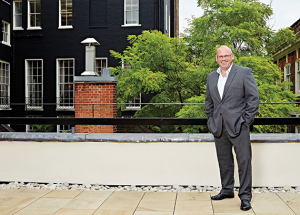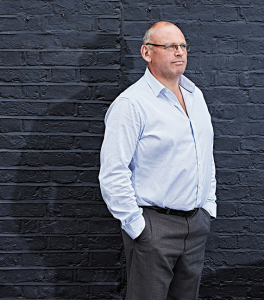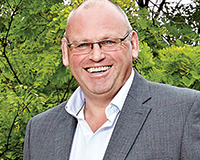 When Tim Johnson announced he was back in the land of sheds after a two-year hiatus, the industry could not have been happier.
When Tim Johnson announced he was back in the land of sheds after a two-year hiatus, the industry could not have been happier.
In August, JLL’s former industrial and logistics director took up the position of development director at Chancerygate. And news write-ups of the comeback of Johnson – who received the Industrial Agents Society’s outstanding contribution to the industry award in 2014 – were glowing.
They described him as a “leading industrial specialist”, “one of the industrial property sector’s most respected experts and personalities” and an “industrial heavyweight”.
With all this praise, clearly Johnson’s return to the logistics stage meant he could have had his pick of any of the big boys in the logistics world – the likes of Prologis or SEGRO, perhaps.
So why choose Chancerygate – a company better known for controlling smaller unit industrial and trade offers, its portfolio totals 6m sq ft of industrial and commercial space.
But when you meet Johnson, you realise why he went with the company, to which he has been brought to “expand the scope of its development programme” and be responsible for “development activities into larger-scale schemes”.
Sabbatical
Modest and down-to-earth, Johnson is open about his reasons for joining Chancerygate. He is also open about what he did during his two-year sabbatical and, more intriguingly, why he left JLL in 2013 to the surprise of many in the industry.
Leaving certainly wasn’t anything to do with King Sturge being bought by the then Jones Lang LaSalle in 2011, he says. Johnson was a partner at King Sturge, moving to director at what is now JLL.
“No, not at all – JLL is a great platform,” he says. His decision to leave was, he says, quite simple. “I felt I was getting stale.”
 Johnson explains further: “I’d never had a break in my career. I left school at 18 and went straight into university, came straight out at 21 in 1985 and within a month I was working at King & Co [which became King Sturge in 1992].
Johnson explains further: “I’d never had a break in my career. I left school at 18 and went straight into university, came straight out at 21 in 1985 and within a month I was working at King & Co [which became King Sturge in 1992].
“I’d been doing the job a long time. People say you need to reinvent yourself and change your job description – but generally my career was all in the industrial market.”
Johnson says it was also good to spend more time with his family – his wife Deidre, daughter Chloe, and son Charlie. “It was nice to have the time at home when my daughter was doing her GCSEs and then her A-levels and then my son had just done his GCSEs,” he says. “I can’t say I was any help to them academically, but it was good to be in the house to support them.”
However, Johnson, whose long-term nickname has been Jumbo, admits the break was also “a lot about me taking care of myself, trying to get fitter”.
He adds: “As my wife called it, I was on my 4G plan: gym, golf, gardening and gallivanting. I spent a lot of time getting healthier and lost some weight, which was great. I’m trying not to put it back on now I’m back in the office, which is going to be a challenge.”
During those two years out, Johnson kept an eye on what was going on in his old sector, but he says: “There was nothing in my mind about coming back into the market. I can honestly say that when I left JLL, I had no intention of coming back. I had no inclination that I would end up at Chancerygate or anywhere else. I was very happy just to go away.”
What enticed him back to the market? “I didn’t want to wake up – whether in a year, two years or five years – and actually regret something, having had the opportunity to come to somewhere like Chancerygate to use my knowledge in a different partof the market. Hopefully, I’m still young enough to have an impact.”
And what enticed him to Chancerygate rather than one of the larger firms was its managing director, Eddie Cook. “I wasn’t looking to join anybody,” says Johnson. “But Eddie asked me in to have a chat, just as an old mate. I’d acted for him when he was at Liverpool Victoria, years ago. To be honest, when I thought about the opportunity, it’s got a fabulous reputation in the market, it’s busy building developments now.”
North West opportunity
Last autumn Chancerygate announced a £100m development programme, and earlier this year, it expanded by opening a Manchester office. “We see a great opportunity in the North West market,” says Johnson.
“But we’re not moving away from our core market in the South East. We want to do business in the Midlands, we want to do business in the North West, and we want to do business wherever we think our occupiers want to take space.”
Chancerygate is thinking big. Johnson says the firm’s chairman, Andrew Johnson, is keen to see the company expand into larger sheds. “It’s not new to Chancerygate,” he adds. “When Chancerygate first started, Andrew was building larger sheds in Park Royal. Like any developer, it has been following the market. That market has been multi-let and freeholds.
“We now want to make sure that we as a business have the opportunity to look at that larger end of the market.”
As well as satisfying occupiers’ needs, there is still money to be made, says Johnson.
“We want a business that’s obviously going to be profitable. We’re doing really well at servicing the needs of occupiers in certain markets and we’re building flexible products. We’re offering a freehold and a leasehold basis depending on where we believe demand might be.
“The bit we’re not servicing is the larger size. Over the past few years, we haven’t been actively seeking out larger opportunities. But we’re now very keen to do that.”
On Chancerygate’s radar for sites are London, the South East, up the M1 into the Midlands and the East Midlands. “These are areas that are very attractive to us and then, obviously, up into the North West and the Leeds M62 corridor,” says Johnson.
Funding for this new phase of development will come from Chancerygate and other unspecified sources. “We’ve got a number of lines into funds and we’ve got existing relationships,” says Johnson.
“Obviously I’ve got other relationships with some people I’ve worked with in the past. When the right opportunities come up, we’ll be talking to those potential funders.”
Could the company’s ambitions lead it into Europe? “No, not for the moment,” says Johnson, adding: “But who knows?”
He explains: “If our customers want us to go and find them some opportunities or have requirements in Europe, then we’ll see what we can do, but at the moment we’re focusing on building the business in the UK.”
With Jumbo Johnson having landed back on the logistics scene with an ambitious company like Chancerygate, clutching his extensive contacts book and his famous reputation, should the likes of Prologis be worried?
In typical modest form, he says: “I’m sure there will be opportunities to work with other developers on projects: it is quite a close-knit community. But I don’t think anyone’s going to be worried.
“They’ve all got their own portfolios, they’ve all got their own business plans. We’ve just got to focus on ours as well and try to add to what we want to do.”
Tim Johnson on the state of the industrial and logistics market
The market is in a really good place at the moment: there is demand out there. Business is obviously more confident. Particularly in London, there is less land for development and so more pressure on the industrial land that’s actually available. We’re going to see some growth in the market and there’s still room for rental growth.
We’re seeing a wall of money being invested or ready to invest in the industrial and logistical sector – and that money needs a home. It’s beholden on us as developers to try to find the opportunities to provide the stock that’s obviously needed from an investor and an occupier point of view.
King & co class of ’84 to ’90
These are the men who have worked with Tim Johnson who have gone on to conquer the UK’s industrial world:
Ian Hawksworth – chief executive Capital & Counties
Phil Redding – appointed chief investment officer at SEGRO in November 2011
Rob Tudor – founder, partner, Tudor Toone
Nigel Rowe – senior vice-president, ProLogis in its global consumer services group
Hugh Chesterton – development director, IDI Gazeley
Nick Vetch – executive chairman and co-founder of Big Yellow
Mark Smith – chief executive of Mapeley
Ken Butcher – aeet manager, logistics, SEGRO
Jim Frankis – partner, Frankis Porter
Gary Yardley – managing director & chief investment officer -Capital & Counties
Will Rowson – ex ING/CBRE Global Investors
John Kingston – head coach at Harlequins rugby club
Chip Mitton – vice-president, Altus Edwin Hill











